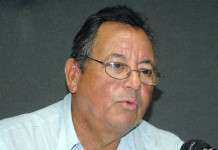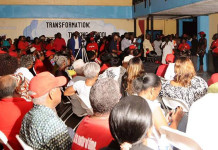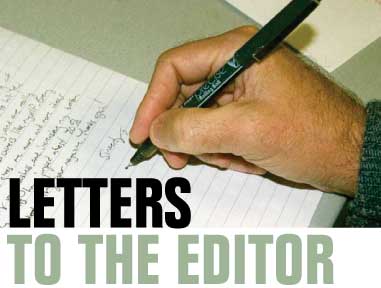The Rt. Hon. Hubert A. Ingraham,
Prime Minister of the Bahamas,
Office of the Prime Minister,
Cable Beach,
Nassau, NP,
Bahamas
Dear Sir:
Let me begin with an introduction of myself and my credentials. My name is LeeMarvin A. Johnson of Freeport, Grand Bahama, formerly of South Beach, New Providence. I was employed with the Bahamas Department of Meteorology (BDM), New Providence serving the country from November 1985 through June 1997 where I moved through the ranks from Trainee to Meteorological Assistant to Meteorological Officer, Grade II. From July 1997 until December 2009, I served the Grand Bahama community at the Freeport Weather Department (FWD) as a Meteorological Forecaster and Meteorologist.
 The Freeport Weather Department (FWD) was a unit within the Air Traffic Services (ATS) of the Grand Bahama Airport Company Limited (GBAC), a division of Hutchison Port Holdings (HPH). Since 1968 the community of Grand Bahama was privileged to have qualified meteorological and climatological reports, forecasts and statistics from highly qualified meteorological officers stationed in Grand Bahama. As of January 1, 2010 this is no longer the case since the FWD was closed effective December 31, 2009, a decision which apparently was made by HPH, the managing partnership of the Grand Bahama Port Authority for the GBAC. This decision led to the termination of five (5) qualified meteorological officers of which I am one. The loss of local weather information to the Grand Bahama community has already had a noticeable impact for just the few months that the operation has been closed. As a 24-year experienced meteorologist and resident of Grand Bahama I thought it important to express some of the concerns with this decision and the impact it portends to the community and the country at large.
The Freeport Weather Department (FWD) was a unit within the Air Traffic Services (ATS) of the Grand Bahama Airport Company Limited (GBAC), a division of Hutchison Port Holdings (HPH). Since 1968 the community of Grand Bahama was privileged to have qualified meteorological and climatological reports, forecasts and statistics from highly qualified meteorological officers stationed in Grand Bahama. As of January 1, 2010 this is no longer the case since the FWD was closed effective December 31, 2009, a decision which apparently was made by HPH, the managing partnership of the Grand Bahama Port Authority for the GBAC. This decision led to the termination of five (5) qualified meteorological officers of which I am one. The loss of local weather information to the Grand Bahama community has already had a noticeable impact for just the few months that the operation has been closed. As a 24-year experienced meteorologist and resident of Grand Bahama I thought it important to express some of the concerns with this decision and the impact it portends to the community and the country at large.
Similar to the Bahamas Department of Meteorology (BDM) in New Providence, the Freeport Weather Department (FWD) functioned mainly as an Aviation Meteorological Station meaning it furnished airlines, pilots and other airport users with aeronautical meteorological reports and forecasts. Additionally, the Department functioned as a Climatological Meteorological Station and Marine Meteorological Station. With changing demographics and community demands, the Department’s services expanded to provide meteorological information to the general public.
Unlike the BDM, the duties of the Forecasters at the FWD also included all duties of the Meteorological Technician and Climatologist. Thus, on a regular shift, the responsibilities of the forecast duty officer at the FWD would include many more tasks than his equivalent at the BDM or any other meteorological service around our region. For many years, these services were rendered with a mere four to five persons on staff and no quality was lost due to the paucity of staffing.
These duties included the taking and dissemination of Meteorological Aviation Routine Reports (METAR), Meteorological Aviation Special Reports (SPECI) (normally the responsibility of the BDM’s Meteorological Technician); Climatology Reports (the responsibility of BDM’s Climatologists); Terminal Aerodrome Forecasts (TAF); Area Forecasts (ARFOR); Public Forecasts, Contracted Marine forecasts, Special Weather Advisories, Tropical Cyclone Forecasts and Advisories; Public broadcasts, media interviews and presentations to civic groups and other organizations (BDM’s personnel with meteorological certification at the grade II level or higher).
Please allow me sir, to expand on only some of the more critical (in my opinion) disadvantages of closing the FWD.
1. OPERATIONAL EQUIPMENT
With the closure of the FWD, the Grand Bahama International Airport is presently using an automated weather observing system (AWOS) to obtain meteorological aviation routine reports. While this system is adequate for aircraft landing and take-off there are a few acknowledged shortcomings. Due to these noted disadvantages a number of airports around our region that utilize an AWOS have found it necessary to supplement an appreciable percentage of their METARs and SPECIs with reports from certified meteorological technicians. Sufficiently so, that the Federal Aviation Administration (FAA) designates these stations as AUGMENTED WEATHER OBSERVING STATIONS (FAA Doc 7900.5B – Surface Weather Observing, Chapter 2, Section 2.2) As a meteorologist, having used the AWOS, I have noted some of these limitations which include:
a) CLOUDS: While the AWOS’s ceilometer (device that uses a laser to determine the amount and height of cloud bases) is adequate over the landing and take-off areas for aircraft, it falls short of reliability for the assessment over the entire aerodrome. Firstly, the AWOS cannot identify dangerous cloud types. Secondly, the AWOS frequently issues false low-ceiling reports when it is raining. Additionally, the ceilometer has a serious defect or a calibration requirement since more often than not it reports “overcast” or “broken” conditions when little or sometimes even no clouds are present above the landing and take-off area. The reverse was also true – overcast field conditions and no clouds reported by the AWOS.
b) METAR AND SPECI reports: Meteorological Aviation Routine reports (METAR) are made once every hour. However, during severe weather events like thunderstorms, lowering visibility and abnormally strong winds, the frequency of observation increases to indicate the deterioration or improvement of such. Consequently, a SPECI must be issued when the International Civil Aviation Organization’s (ICAO) and World Meteorological Organization’s (WMO) criteria for issuance are met. The AWOS at Freeport does not issue SPECI’s to meet ALL ICAO/WMO requirements especially when the need to indicate the beginning or cessation of some severe weather conditions occurs.
Aircraft mishaps also require SPECI reports to be taken and transmitted according to ICAO and WMO regulations whether the mishap is weather related or not. The determination of a weather-related aircraft incident is made during the mandated investigation. During the investigations the investigating officer reviews and records the SPECI along with conducting interviews with the on-duty meteorological officer. A less than adequate system could cause serious liabilities.
c) VISIBILITY: With approaching weather systems that contain any visibility-changing hydrometeor, it has been noticed that the AWOS system does not respond in a timely manner to the changes in visibility and therefore does not display improving or deteriorating visibility as per ICAO regulations. On EVERY occasion this can be realized and has become a major drawback to the AWOS system.
d) CLIMATOLOGY: Because the AWOS’s sensors are exposed near the ends of the airport’s runway, its output cannot be used as a reliable source of climatological data which requires that instrumentation be exposed under recommendations prescribed by the WMO.
The limitations with the automated system, as noted above, were minimized with manual observations provided by the meteorological officer on duty. Aside from the AWOS output, pilots (mainly smaller aircrafts) were also able to obtain briefing and consultation before departure and while in flight for avoidance of severe weather areas. This service was always noted as a bonus to the general aviation traffic on Grand Bahama;
1. MARINE METEOROLOGY
The BDM provides a generalized marine forecast for the Commonwealth. However, just as airline pilots require a more fine-tuned assessment and forecast for each individual airport, experienced has shown that mariners would prefer localized accurate marine information.
The arrival of tides, for example, differs for every island in the Commonwealth. In fact, on our island, tide times can sometimes vary by well over one hour at different locations. Tide times are not only important for local fishermen and beach-goers but also international ships and freighters coming to any port around the islands. While the BDM can supply tide times for New Providence and some of the other major islands around the Commonwealth, these only represent a small fraction of tide times along each shore.
Secondly, most Grand Bahama residents are quite aware of the effects of tide arrival, moon phase and weather systems on the stretch of the Warren J Levarity Highway commonly known as the “Fishing Hole Road”. Because of the potential for disaster and frequency of use between residents of the large communities of Eight Mile Rock and West End and the cities of Freeport and Lucaya, it is imperative the meteorologists monitor any potential threats to the area. Being able to accurately and timely make predictions concerning the Fishing Hole Road has proven to be very important over the years even outside of the hurricane season;
1. 3. HURRICANE SEASON (JUNE – NOVEMBER)
Since 1999 the island of Grand Bahama has felt the effects of 4 major hurricanes (category 3 and above) namely, Floyd 1999, Frances and Jeanne 2004 and Wilma 2005. While theoretical meteorology can prove an invaluable asset, the passage of each of these systems has provided us as meteorologists with invaluable practical knowledge of the effects (geographically) of the passage of hurricanes on the north, east and southwestern shores of Grand Bahama. Even with that experience, there is so much more practical knowledge to gain that will prove invaluable to the other islands around the Commonwealth. Additionally, the value of information gained and exchanged between the department, mariners and residents is inestimable. Losing this exchange of information during an ominous occasion such a tropical cyclone passage can prove to be more costly than we may imagine.
During the North Atlantic Tropical cyclone season, tropical weather outlooks and updates are issued by the National Hurricane Center in Miami, Florida. These are then qualified and issued by the BDM and FWD for the Commonwealth of the Bahamas. The FWD was responsible for keeping the Grand Bahama Port Authority, Grand Bahama Airport Company, Freeport Harbor Company, Freeport Container Port and by extension, the Grand Bahama community at large sufficiently informed about any and all necessary updates on impending tropical cyclones. These updates are only issued after consultation with the BDM and serve to fine tune BDM’s advisories to tailor them to Grand Bahama Island. This has proven to be a very prudent and beneficial operation to all of the communities and townships around the island. The FWD, with its qualified and experienced staff, provided invaluable assistance to the BDM and to the GB community as it relates to accurate forecasting, warnings and damage potential during the passage of the storm systems, to which many will attest.
There are a few other concerns that merit consideration:
* There is an inherent inseparability of meteorology and aviation which still remains;
* The provision of Terminal Aerodrome Forecasts (TAF) by forecasters of the BDM is much too frequently rendered unreliable because of the limited weather observation coverage from the Grand Bahama International Airport. (ref. National Weather Service operations manual – d 31 on TAF);
*One can only imagine the impact on our tourism product should international flights decide to cease operation on Grand Bahama because of the lack of proper and professional meteorological briefing and consultation especially during adverse weather conditions;
* It takes time to acclimatize to an area, i.e. to learn its geographical idiosyncrasies. Even if BDM deploys forecasters to Freeport it would be a while before they are familiar with the territory;
* Having persons on hand who are familiar with your local geography is infinitesimally more advantageous than a remote observer/forecaster especially when considering the damage potential on each shore of any major weather system. Therefore, having an extra “set of eyes” in the north improves the overall product;
* The FWD was an Integral part of the Grand Bahama disaster preparedness committee which included other essential services like the Royal Bahamas Police Force, BASRA, the Rand Memorial Hospital, Sanitation Services, The Freeport Power Company, BORCO, and all island administrators;
* There are five qualified persons on the island who want to work. Substantial consideration should be given to the time it takes to train and qualify meteorologists in addition to the experience needed for producing a quality product. To have qualified persons in an essential service either walking the streets or in some other profession, respectfully but quite frankly, is a waste;
* Meteorology affects every aspect of our daily lives and consequently, affects all ministries within the government. So much so that schools have found it necessary to add meteorology to their science curriculum. We therefore, cannot deny that it is an essential service to our country;
* The entire situation simply does not bode well for public relations.
Time is essential. Another hurricane season is almost upon us. We ought not to leave the Northern Bahamas less equipped than they were before to face the onslaught of a worst case scenario.
Thank you for your service to our wonderful country.
Respectfully,
Meteorologist








Wow a smoking gun!!!Now I see why so many are against a Commission of Enquiry but the Opposition must press this issue even if it means civil disobedience to have one intiated.Oh boy this sis gross neglect and any attempt to puniosh Met Officers b4 an Enquiry will not sit well with many Bahamians.
KUDOS to you,mr.JOHNSON!!! You have shown yourself to be a TRUE PROFESSIONAL.Not only did you WARN our government about the importance of the met remaining open in Freeport,you also had the COURAGE to put these facts in writing to the prime minister.UNFORTUNATELY like all things in the Bahamas because you are only a BAHAMIAN and not some WHITE,FOREIGN CONSULTANT YOUR Warnings went unheeded.
yes i agree…..my only hope is that you`re not use as some political ploy by the two partys, and some common sense in all that you`ve said would be taken in and absorbed. Mr Prime Minister……….please, re-open that office!! For godsake, just once would you people listen to the voice of the bahamian people!!
Johnson do you think that letter would ever make the WUTLESS MEDIA? Never is a snowball chance. They would talk about it but not publish it.
Bahamas Press/EDitor
Mr. Johnson thanks for your valauble information. We tend to place such little value on Bahamians who are in the service of our country, just to save a few dollars.
Comments are closed.